Nikki Giovanni, Poet Who Wrote of Black Joy, Dies at 81
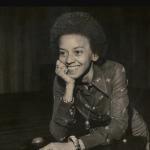
Nikki Giovanni, the charismatic and iconoclastic poet, activist, children’s book author and professor who wrote, irresistibly and sensuously, about race, politics, gender, sex and love, died on Monday in Blacksburg, Va. She was 81.
Her death, in a hospital, was caused by complications of lung cancer, said Virginia C. Fowler, her wife.
Ms. Giovanni was a prolific star of the Black Arts Movement, the wave of Black nationalism that erupted during the civil rights era, propelled by her, the novelist John Oliver Killens, the playwright and poet LeRoi Jones (later known as Amiri Baraka) and the poets Audre Lorde, Ntozake Shange and Sonia Sanchez, among others. Like many women in the movement, Ms. Giovanni was confounded by the machismo that dominated it.
Yet she was also independent of the movement as a celebrity poet and public intellectual who appeared on television and toured the country. She was a riveting performer, diminutive at 105 pounds — as reporters never failed to point out — her cadence inflected by the jazz and blues music she loved, her timing that of a comedian or a Baptist preacher. She drew crowds wherever she appeared. She said her best audiences were college students and prison inmates.
In 1972, when she was 29, Ms. Giovanni sold out the 1,000-plus seats at Lincoln Center’s Alice Tully Hall, reading her poems alongside gospel music performed by the New York Community Choir.
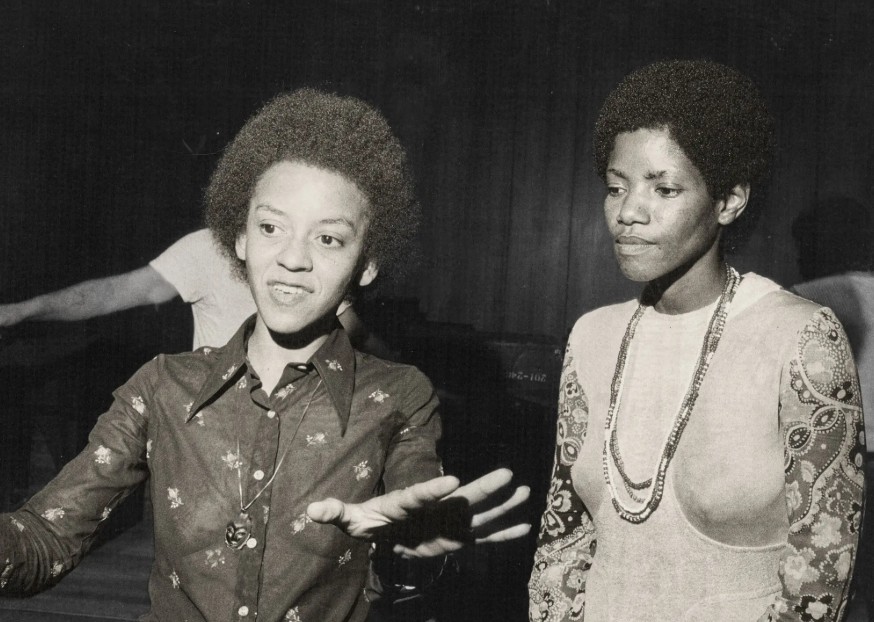
Soon after, for her 30th birthday, she sold out Philharmonic Hall (now David Geffen Hall), all 3,000 seats, where she was joined by Melba Moore and Wilson Pickett, who sang gospel numbers with the same choir that took part in her earlier show. The audience joined in, too, with gusto, The New York Times reported, especially when she read one of her best-known poems, a stirring paean to Black female agency called “Ego-Tripping,” which generations of Black girls have performed at school. It begins:
I was born in the congo
I walked to the fertile crescent and built
the sphinx
I designed a pyramid so tough that a star
that only glows every one hundred years falls
into the center giving divine perfect light
I am bad
And it concludes, triumphantly:
I am so perfect so divine so ethereal so surreal
I cannot be comprehended
except by my permission
I mean … I … can fly
Like a bird in the sky …
By 1971, Ms. Giovanni had already published a memoir, “Gemini: An Extended Autobiographical Statement on My First Twenty-Five Years of Being a Black Poet.” Fiercely intelligent, she never lacked confidence, never suffered fools and was, in her youth, a fan of Ayn Rand, that apostle of individualism. In her memoir she wrote about the contradictions and false pieties of the Black Power movement, her scrappiness as a child and her ambivalence about gender relations. She was not convinced that men and women were meant to live together.
“Maybe they have a different thing going,” she wrote, “where they come together during mating season and produce beautiful, useless animals who then go on to love, you hope, each of you.”
Her poem “Housecleaning” made the point succinctly:
i always liked housecleaning
even as a child
i dug straightening
the cabinets
putting new paper on
the shelves
washing the refrigerator
inside out
and unfortunately this habit has
carried over and I find
i must remove you
from my life
In her early years, much of her poetry was boldly militant, as she addressed the horrors that had galvanized the civil rights movement: the murders of Emmett Till, the four Black girls in the Birmingham church bombing and the Rev. Dr. Martin Luther King Jr. “No one was much interested in a Black girl writing what was called ‘militant’ poetry,” she wrote in “Gemini,” so “I formed a company and published myself.”
To mollify the church ladies she had grown up with — particularly her beloved grandmother, who might be put off by her incendiary work — she recorded an album, “Truth is on its Way” (1971), with the New York Community Choir.
“I wanted something my grandmother could listen to,” Ms Giovanni told Ebony magazine in 1972, “and I knew if gospel music was included, she would listen.”
Along with “Ego Tripping,” the album included another enduring hit, “Nikki-Rosa,” which ended with:
and I really hope no white person ever has cause
to write about me
because they never understand
Black love is Black wealth and they’ll
probably talk about my hard childhood
and never understand that
all the while I was quite happy
Yolande Cornelia Giovanni Jr. was born on June 7, 1943, in Knoxville, Tenn., to Yolande (Watson) Giovanni and Jones Giovanni, known as Gus. Her older sister, Gary Ann, nicknamed her Nikki. Soon after her birth, the family moved to Cincinnati, where Yolande and Gus began working as house parents in a school for Black boys, earning only one salary between them. Later, they would each teach grade school.
Nikki’s father was abusive toward her mother. It enraged her, as did her mother’s acceptance of it.
By 15, “I was either going to kill him or leave,” she said later, so she moved to Knoxville to live with her grandparents. She graduated early from Austin High School (now Austin-East Magnet High School), where her grandfather taught Latin, to attend Fisk University, the historically Black college in Nashville, where, after a hiatus of a few years, she earned a bachelor’s degree in history with honors in 1967.
She had been thrown out for leaving campus without permission, and for protesting other campus rules. Becoming a debutante was not among her aspirations (she later wrote a poem about it), which made her an odd fit among Fisk’s sorority sisters.
But when she returned to resume classes, the climate had changed; she studied with Mr. Killens, a founder of the Harlem Writers Guild; helped restart a chapter of the Student Non-Violent Coordinating Committee; and began to write.
Ms. Giovanni attended the University of Pennsylvania’s School of Social Work on a Ford fellowship, but dropped out. She was not cut out for social work. The dean arranged for Ms. Giovanni to receive a National Endowment for the Arts fellowship to attend Columbia University’s School of Fine Arts, but she soon left to write full time.
She self-published her first two books, “Black Feeling Black Talk” and “Black Judgment,” in 1968. Her son, Thomas, was born in 1969: “I had a baby at 25 because I wanted to have a baby and I could afford to have a baby,” she told Ebony magazine with vehemence. “I didn’t get married because I didn’t want to get married and I could afford to not get married.” She never publicly identified the father.
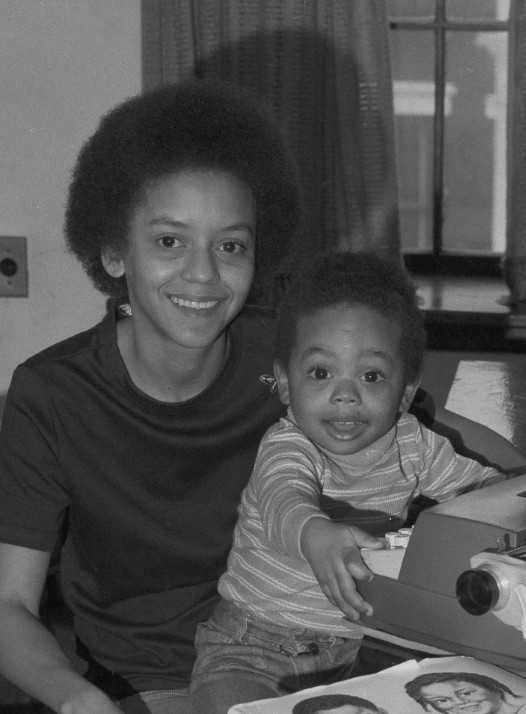
But she did need to hustle. She hit the lecture circuit, and she began appearing regularly on “Soul!,” the Black culture program that aired on public television from 1967 to 1972.
For one segment, she conducted a captivating two-hour interview with her hero James Baldwin, which was filmed in London and ran as a two-part special in 1971. She was 28 and Mr. Baldwin was 47. It was astonishing, as The New Yorker put it: “Two of the most important artist-intellectuals of the twentieth century were engaged in intimate communion on national television.”
Wreathed in plumes of cigarette smoke (it was the 1970s), she asked Mr. Baldwin about her father, who was, in her estimation, emblematic of so many Black men: What to do about a man who is mistreated in the world and comes home and brutalizes his wife? Where did that leave his daughter?
“I’m afraid of Black men,” she said, adding, “It’s a cycle and it’s unfortunate because I need love.”
Later in their conversation, she said, “There has to be a way to do what we do and survive, which is what seems to me to be missing.”
“Sweetheart,” Mr. Baldwin answered. “Sweetheart. Our ancestors taught us how to do that.”
(Parts of their exchange can be see in the 2023 HBO documentary “Going to Mars: The Nikki Giovanni Project,” written and directed by Joe Brewster and Michèle Stephenson.)
Ms. Giovanni held teaching positions at Rutgers University and Queens College before Ms. Fowler, then the associate head of the English department at Virginia Tech, in Blacksburg, recruited her in 1987 to be a visiting professor. She and Ms. Fowler were a couple ever since. Ms. Giovanni earned tenure a few years later, and along the way Ms. Fowler became a scholar of her work, editing her collections and writing her biography, “Nikki Giovanni” (2013). They married in 2016, and both retired in 2022.
Ms. Giovanni called Ms. Fowler her bench, as she explained to Elizabeth Harris of The New York Times in 2020.
“Everybody needs a bench, and in order to get a bench, you have to be one,” she said. “I could say love, but you get tired of hearing about love.”
That said, she wrote many enticing love poems, including one that began, “I wrote a good omelet … and ate a hot poem … after loving you.”
Hilton Als, the cultural critic and New Yorker writer, said in a phone interview that when he first heard Ms. Giovanni perform in the early 1970s, he was struck by her forceful presence and the story she was telling, about a strong Black woman and the home that sustained her, epitomized in her poem “My House.”
i mean it’s my house
and i want to fry pork chops
and bake sweet potatoes
and call them yams
cause i run the kitchen
and i can stand the heat
“It was a voice you didn’t hear a lot then, this desire for home,” Mr. Als said. “Later, as she ditched the Black nationalist rhetoric, she became more herself. She was saying something really profound to me, a member of the gay community and the Black world and whatever. She was the first warrior in terms of talking about queer love — not specifically, but it was there.”
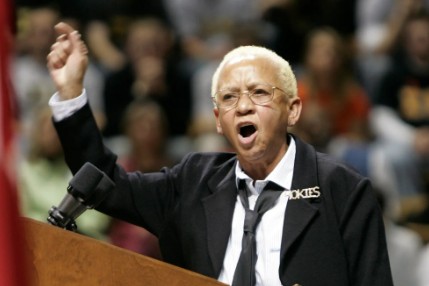
A traumatic footnote to Ms. Giovanni’s academic career came in 2007, when a senior at Virginia Tech fatally shot 32 people and himself. The young man, Seung-Hui Cho, had been a student of Ms. Giovanni’s. She had objected to his behavior in class, which frightened her other students, and asked him to either stop or leave. He declined to stop, and afterward was taught privately by the department head. Ms. Giovanni spoke at a memorial for the murdered students, reciting a poem she wrote called “We Are Virginia Tech.”
“We are better than we think,” she said, “but not quite what we want to be.”
Among many honors, Ms. Giovanni received seven N.A.A.C.P. awards and 31 honorary doctorates. A scientist who was a fan, Robert James Baker, named a species of bat after her, the Micronycteris giovanniae.
She was the author of more than 30 books, many for children and three of which were best sellers. A new volume, “The New Book: Poems, Letters, Blurbs, and Things,” is expected to be published next year.
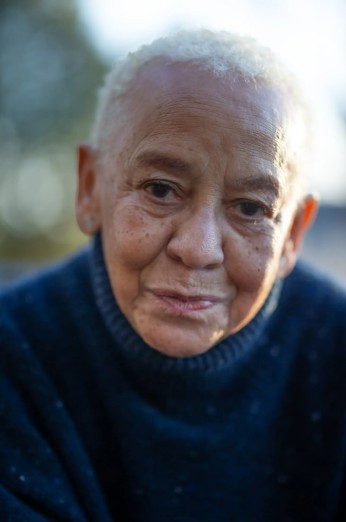
In addition to Ms. Fowler, Ms. Giovanni is survived by her son, Thomas, and a granddaughter.
“I really like what the young people are doing,” Ms. Giovanni told The Times in 2020, reflecting on the Black Lives Matter movement and the work of her students, “and I think my job is to be sure to get out of their way, but also let them know, if it means anything to them, that I’m proud of them.”
“I recommend old age,” she added. “There’s just nothing as wonderful as knowing you have done your job.”
[Penelope Green is a reporter on the Obituaries desk of The New York Times.
"I write stories about individuals who have made their mark on our culture, illuminating the lives of those who have impacted the world in often unusual ways. Some are newsmakers, like Mary Quant, who may (or may not) have invented the miniskirt; others you might not have heard of, like Catherine Burks-Brooks, who at just 21 joined the Freedom Riders and stood up to a notorious bigot, or Betty Rowland, one of burlesque’s last queens.
My Background
For over three decades as an editor and feature writer at The New York Times, I’ve covered behavioral and cultural trends, reporting on the myriad ways we work, play, eat, sleep, nest and make art. I’ve profiled musicians, authors, artists, designers and a New York City apartment building. I was one of the first American journalists to subject herself to the Marie Kondo method, and I spent the night in Manhattan’s first micro-apartment. I once visited a commune that nobody joined.
Before I joined The Times, I was an editor at 7 Days, an award-winning New York City weekly that folded in 1990. I was born in Washington, D.C., grew up in Manhattan and dropped out of Sarah Lawrence College in Bronxville, N.Y."
